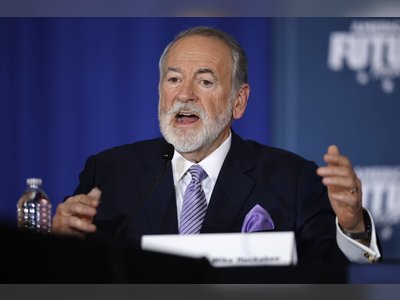
Rishi Sunak Sets July 4 for UK General Election Amid Economic Improvement and Crisis Backdrop
British Prime Minister Rishi Sunak announced on July 4 as the date for a national election in the UK, aiming to boost voter confidence with good economic news.
The Conservative Party, which has been in power for 14 years, has faced a series of crises including an economic slump, ethics scandals, and leadership changes.
The center-left Labour Party is expected to win the election, and Sunak's sudden call for a Cabinet meeting and Foreign Secretary David Cameron's early return from a trip fueled speculation about an imminent vote.
The UK election is taking place amidst a cost-of-living crisis and disputes over handling migrant and asylum seeker crossings from Europe.
On the same day, official figures revealed UK inflation had dropped to 2.3 percent, the lowest in nearly three years, due to decreases in domestic bills.
This is a significant achievement towards the five pledges made by Prime Minister Rishi Sunak in January 2023, including reducing inflation, which had reached over 11 percent at the end of 2022.
Sunak celebrated this progress, stating, "Today marks a major moment for the economy, with inflation back to normal.
Brighter days are ahead, but only if we stay committed to enhancing economic security and opportunity for all." The United Kingdom is holding an election to choose all 650 members of the House of Commons for a term up to five years.
The party with a majority in the Commons will form the next government, and its leader will be prime minister.
Currently, Labour, led by Keir Starmer, is favored to win.
Starmer, a former chief prosecutor, has gained momentum after local election successes and defections from Conservative lawmakers.
He has announced a platform focusing on economic stability following years of inflation.
Prime Minister Rishi Sunak of the UK made promises to enhance border security, hire more teachers, police officers, and decrease long hospital waitlists.
The UK's general elections must occur every five years, and Sunak had until December 2023 to call one, with the last election taking place in December 2019.
Political analysts believed that holding an election in the fall would benefit the Conservatives due to potential economic improvements, tax cuts, lower interest rates, and the implementation of a contentious asylum-seeker deportation plan to Rwanda.
Sunak had been ambiguous about the election date, but on a Wednesday lunchtime, he did not confirm a second-half-of-the-year election.
Sunak took office after Liz Truss, who had a disastrous 49-day tenure due to economic policies that upset financial markets.
Despite reducing inflation, Sunak's efforts to grow the economy, cut healthcare waiting lists, reduce debt, and stop migrant influx have faced challenges.
His success has been limited following the instability caused by Truss's short-lived premiership, which came after Boris Johnson was ousted due to ethics scandals.
The center-left Labour Party is expected to win the election, and Sunak's sudden call for a Cabinet meeting and Foreign Secretary David Cameron's early return from a trip fueled speculation about an imminent vote.
The UK election is taking place amidst a cost-of-living crisis and disputes over handling migrant and asylum seeker crossings from Europe.
On the same day, official figures revealed UK inflation had dropped to 2.3 percent, the lowest in nearly three years, due to decreases in domestic bills.
This is a significant achievement towards the five pledges made by Prime Minister Rishi Sunak in January 2023, including reducing inflation, which had reached over 11 percent at the end of 2022.
Sunak celebrated this progress, stating, "Today marks a major moment for the economy, with inflation back to normal.
Brighter days are ahead, but only if we stay committed to enhancing economic security and opportunity for all." The United Kingdom is holding an election to choose all 650 members of the House of Commons for a term up to five years.
The party with a majority in the Commons will form the next government, and its leader will be prime minister.
Currently, Labour, led by Keir Starmer, is favored to win.
Starmer, a former chief prosecutor, has gained momentum after local election successes and defections from Conservative lawmakers.
He has announced a platform focusing on economic stability following years of inflation.
Prime Minister Rishi Sunak of the UK made promises to enhance border security, hire more teachers, police officers, and decrease long hospital waitlists.
The UK's general elections must occur every five years, and Sunak had until December 2023 to call one, with the last election taking place in December 2019.
Political analysts believed that holding an election in the fall would benefit the Conservatives due to potential economic improvements, tax cuts, lower interest rates, and the implementation of a contentious asylum-seeker deportation plan to Rwanda.
Sunak had been ambiguous about the election date, but on a Wednesday lunchtime, he did not confirm a second-half-of-the-year election.
Sunak took office after Liz Truss, who had a disastrous 49-day tenure due to economic policies that upset financial markets.
Despite reducing inflation, Sunak's efforts to grow the economy, cut healthcare waiting lists, reduce debt, and stop migrant influx have faced challenges.
His success has been limited following the instability caused by Truss's short-lived premiership, which came after Boris Johnson was ousted due to ethics scandals.
Translation:
Translated by AI











